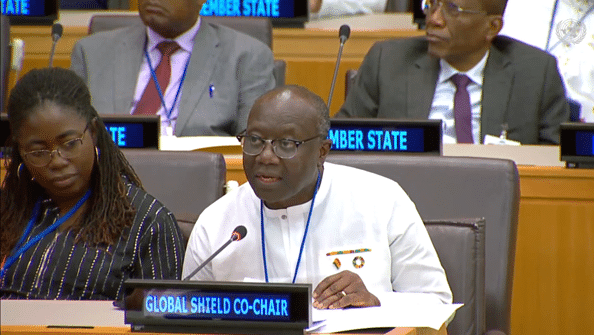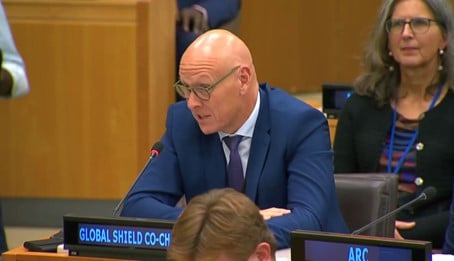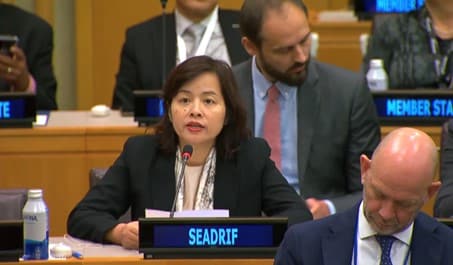World leaders met at the United Nations Climate Ambition Summit in New York on 20th September 2023, with the goal of accelerating collaborative efforts among governments, corporate entities, financial institutions, municipal administrations, and civil society organisations towards building more climate-resilient countries and economies. Particularly important to vulnerable countries and communities was the Secretary General’s Special Meeting on Loss and Damage which aimed at identifying key initiatives to scale up the international financial architecture under Loss and Damage.
High-level representatives from Multilateral Development Banks (MDBs), Bilateral Development Institutions, Global Climate Funds, the private sector, civil society organisations, and risk financing vehicles stressed the need to avoid fragmentation and strengthen international collaboration to build a complementary and coherent financial system that reaches the most vulnerable.

Hon. Ken Ofori-Atta, Global Shield Co-Chair (©UN Web TV)
The Co-Chairs of the Global Shield against Climate Risks presented the joint initiative as a key contribution to address these needs. Hon. Ken Ofori-Atta, Chair of the Vulnerable Twenty (V20) Group of Finance Ministers and the Climate Vulnerable Forum, emphasized the “aim of pre-arranged and trigger-based financing to ensure automatic and effective protection when climate-related damages occur”. Global Shield Co-Chair Dr. Bärbel Kofler was represented by Dirk Meyer, Director General on Climate at the German Federal Ministry of Economic Cooperation and Development. He pointed out that the “Global Shield can be a major contribution to future financial arrangements around Loss and Damage and pre-arranged finance” and invited “stakeholders from around the world to join forces”.

Dirk Meyer, representing Global Shield Co-Chair Dr. Bärbel Kofler (©UN Web TV)
Many of the speakers at the UN Climate Ambition Summit highlighted the need for greater cooperation and more efficient processes for providing support to vulnerable countries. The Global Shield’s new mode of collaboration was accentuated by several high-level representatives of regional risk pools as a positive example of how coordination can be better facilitated. Aholotu Palu, CEO of the Pacific Catastrophe Risk Insurance Company (PCRIC), explained the urgency to improve disaster response in the Pacific and applauded the Global Shield’s active collaboration with risk pools to provide innovative solutions. Hien Anh Than, Executive Director of the Southeast Asia Disaster Risk Insurance Facility (SEADRIF) emphasized the Global Shield’s comprehensive approach in scaling up disaster risk finance and highlighted the need for closer engagement with risk pools as the core building block of the international financial architecture. Ibrahima Cheikh Diong, Director General of the African Risk Capacity (ARC), demanded the investment of existing resources into mainstream early warning systems as well as into the loss and damage funding arrangements to protect the lives and livelihoods of vulnerable populations in Africa.

Hien Anh Than, Executive Director of the Southeast Asia Disaster Risk Insurance Facility (©UN Web TV)
Rowan Douglas, Chair of the Operating Committee for the Insurance Development Forum (IDF) presented key results of a study that exemplifies the urgency of a strong financial architecture against climate risks. The study that will be published around COP28 demonstrates that Small Island and Developing States (SIDS) in the Pacific, Caribbean and Indian Ocean are at risk of losing up to 300% of their GDP from climate risks next year. The IDF’s research suggests that with approximately 300 million dollars from risk capital markets, this loss could be reduced to no more than 10% of their GDP.
It is against the background of this growing demand for financial support to tackle loss and damage that the V20 and the G7 under Germany’s presidency launched the Global Shield. The Global Shield provides a concrete offer for countries to scale financial protection for their most vulnerable population groups, and thus contribute to addressing loss and damage. It can serve as a platform for pre-arranged finance as it is coordinating the implementation of pre-arranged finance through the Global Shield Coordination Hub and is helping countries to easily access to much needed support by identifying gaps and voicing needs through inclusive and country-led country processes. It is furthermore facilitating joint standards, synergies and complementary work across leading implementing organisations, including MDBs, the private sector, development organisations and civil society. The Global Shield plans to continue working on facilitating this collaboration between financial institutions and other stakeholders through its in-country work and will be showcasing first results at COP28.
